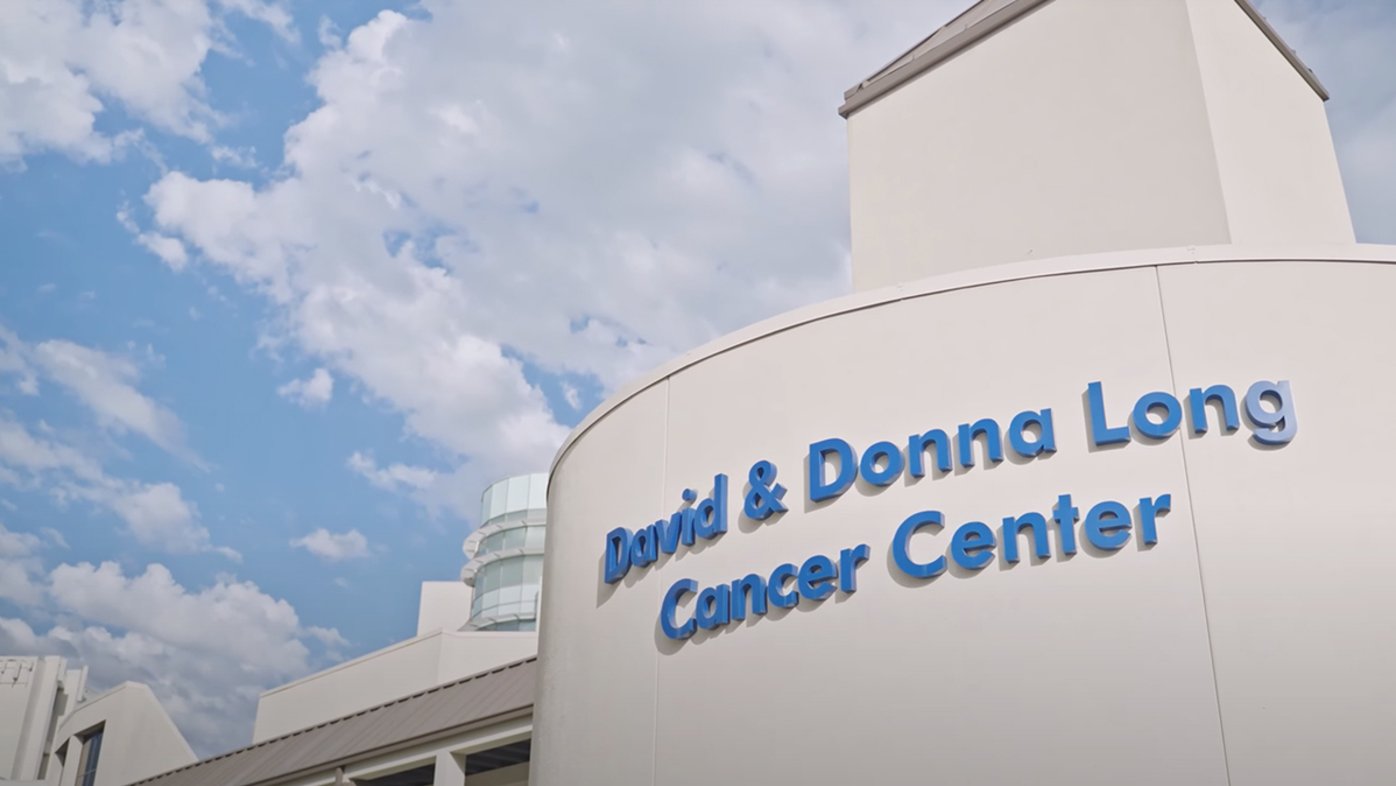

Cancer clinical trials
Your access to cutting-edge cancer treatments
As a leader in clinical oncology research, our Sharp Center for Research offers you the latest clinical trials that assist in discovery of new and improved treatments to help you overcome cancer. With a wide selection of open trials for almost every tumor site we give you more options for cancer research.
As a participant of a clinical trial, you are guided through the use of experimental drugs or treatments that have been recommended based on your type of cancer. Please visit the links below for additional detailed information about our clinical trials.
More people are living longer thanks to successful cancer treatments resulting from clinical trials. Before new treatments are introduced to patients, they are first studied in the laboratory.
Once preliminary research indicates the possible benefits of a new treatment, clinical trials go through three phases. Phase 1 tests for safety, Phase 2 tests for effectiveness, and Phase 3 tests for both safety and effectiveness in a larger group of patients.
Only after a new treatment passes all three clinical trial phases is it then cleared for general use. All approved cancer treatments available today began as clinical trials.
High-level patient care — Participants receive close monitoring and guidance by clinical trial coordinators and their oncologist.
Access to promising new treatments — Participants may receive a treatment that will be more effective than the standard treatment, and unavailable outside of a clinical trial.
Better treatments — Participants help expand researchers' knowledge and determine whether new treatments will improve outcomes for future patients with cancer.
There may be some costs associated with participating in a trial. Most patients are responsible for copays and deductibles as they would be if they were receiving treatment outside of a clinical trial. The research team will discuss any possible costs with you prior to enrolling.
Ask your doctor if any study at Sharp may be appropriate for you. Your doctor should explain the criteria for trial eligibility, including the stage of cancer being studied; how results will be evaluated; and the potential benefits and risks, such as side effects or other health impacts.
You will receive an informed consent form outlining the purpose of the clinical trial and the risks involved. If there is anything on the form that you do not understand, ask your doctor before signing.
During a clinical trial, you will be monitored and observed closely. If at any time you or your doctor believes the treatment is not in your best interest, you can leave the study.
Enroll in an active cancer clinical trial
If you are interested in participating in a clinical trial, please consult with your physician or contact the Sharp Center for Research by calling 858-939-4030 or by sending us an email.
A071701, Genomically-guided Treatment Trial in Brain Metastases (NCT03994796), Alliance for Clinical Trials in Oncology
SHCGBM-003, Evaluation of Claudin-18.2 receptor expression in Glioblastoma Patients. This study is non-interventional. For more information, please contact a Sharp clinical trials specialist at 858-939-4030 or ClinicalOncologyResearch@sharp.com.
D8531C00002, CAMBRIA-1: A Phase III, Open-Label, Randomized Study to Assess the Efficacy and Safety of Extended Therapy with Camizestrant (AZD9833, a Next Generation, Oral Selective Estrogen Receptor Degrader) versus Standard Endocrine Therapy (Aromatase Inhibitor or Tamoxifen) in Patients with ER+/HER2- Early Breast Cancer and an Intermediate or High Risk of Recurrence Who Have Completed Definitive Locoregional Therapy and at Least 2 Years of Standard Adjuvant Endocrine-Based Therapy Without Disease Recurrence (NCT05774951), AstraZeneca
SDX-0103, Amelia-1: This is a Phase 1b/2, open-label, parallel-arms pilot study in post-menopausal women with hormone receptor positive (HR+), HER2- advanced or metastatic breast cancer with an alteration in the PI3K pathway, including a mutation of the PIK3CA gene, PTEN loss, or AKT1 mutation, designed to determine the safety of evexomostat (SDX-7320) plus standard of care treatment alpelisib (BYL-719) or capivasertib and fulvestrant (each combined, the 'triplet therapy'), to measure the severity and number of hyperglycemic events, and to assess clinical, anti-tumor benefit of the triplet therapy, (NCT05455619), SynDevRx, Inc.
DS3201-324, A Study of Valemetostat Tosylate in Combination With DXd ADCs in Subjects With Solid Tumors, (NCT06244485), Daiichi Sankyo
RGX-202-001, A Phase 1 Study of RGX-202-01 (Ompenaclid), a Small Molecule Inhibitor of the Creatine Transporter SLC6a8, as a Single Agent and as Combination Therapy in Patients With Advanced Gastrointestinal Malignancies With Select Expansion Cohorts, (NCT03597581), Inspirna, Inc.
CRDF-004/Z0101001, A Phase 2, Randomized, Open-label Study of Onvansertib in Combination With FOLFIRI and Bevacizumab or FOLFOX and Bevacizumab Versus FOLFIRI and Bevacizumab or FOLFOX and Bevacizumab for First-line Treatment of Metastatic Colorectal Cancer in Patients With a KRAS or NRAS Mutation, (NCT06106308), Cardiff Oncology
MCLA-158-CL01, A Phase 1/2 Dose Escalation and Cohort Expansion Study Evaluating MCLA-158 (Petosemtamab) as Single Agent or in Combination in Advanced Solid Tumors, (NCT03526835), Merus N.V.
DB1303-O-1001, A Phase 1/2a Study of DB-1303/BNT323 in Advanced/Metastatic Solid Tumors, (NCT05150691), DualityBio, Inc.
D9078C00001, A Phase III, double-blind, placebo-controlled, Randomised, Multicentre, International Study of Durvalumab Plus Oleclumab and Durvalumab Plus Monalizumab in Patients With Locally Advanced (Stage III), Unresectable Non-small Cell Lung Cancer (NSCLC) Who Have Not Progressed Following Definitive, Platinum-Based Concurrent Chemoradiation Therapy (PACIFIC-9) (NCT05221840), AstraZeneca
FF10832-PEM-201, A Phase 2a Study With Safety Run-in to Evaluate the Safety, Tolerability, and Preliminary Efficacy of FF-10832 Monotherapy or in Combination With Pembrolizumab in Patients With Advanced Solid Tumors, (NCT05318573), Fujifilm Pharmaceuticals
DS3201-324, A Study of Valemetostat Tosylate in Combination With DXd ADCs in Subjects With Solid Tumors, (NCT06244485), Daiichi Sankyo
FALCON, Ethnicity and Lung Cancer Survival: A Test of the Hispanic Sociocultural Hypothesis, University of Arizona. This study is not a clinical trial and is only observational. For more information, please contact a Sharp clinical trials specialist at 858-939-4030 or ClinicalOncologyResearch@sharp.com.
BGB-3111-308, MAHOGANY: A Phase 3 Randomized, Open-Label Multicenter Study of Zanubrutinib (BGB-3111) Plus Anti-CD20 Antibodies Versus Lenalidomide Plus Rituximab in Patients With Relapsed/Refractory Follicular or Marginal Zone Lymphoma, (NCT05100862), BeiGene
CA057-001, A Phase 3, Two-Stage, Randomized, Multicenter, Open-Label Study Comparing Mezigdomide (CC-92480), Bortezomib and Dexamethasone (MEZIVd) Versus Pomalidomide, Bortezomib and Dexamethasone (PVd) in Subjects With Relapsed or Refractory Multiple Myeloma (RRMM): SUCCESSOR-1, (NCT05519085), Bristol Myers Squibb/Celgene
NRG GU009, Parallel Phase III Randomized Trials for High Risk Prostate Cancer Evaluating De-Intensification for Lower Genomic Risk and Intensification of Concurrent Therapy for Higher Genomic Risk With Radiation (PREDICT-RT*), *Prostate RNA Expression/Decipher To Individualize Concurrent Therapy with Radiation, (NCT04513717), NRG Oncology
NRG GU010, Two Studies for Patients With Unfavorable Intermediate Risk Prostate Cancer Testing Less Intense Treatment for Patients With a Low Gene Risk Score and Testing a More Intense Treatment for Patients With a Higher Gene Risk Score/ Parallel Phase III Randomized Trials of Genomic-Risk Stratified Unfavorable Intermediate Risk Prostate Cancer: De-Intensification and Intensification Clinical Trial Evaluation (GUIDANCE), (NCT05050084), NRG Oncology
A Randomized, 2-cohort, Double-blind, Placebo-controlled, Phase III Study of Saruparib (AZD5305) in Combination With Physician's Choice New Hormonal Agents in Patients With HRRm and Non-HRRm Metastatic Castration-Sensitive Prostate Cancer (EvoPAR-Prostate01), (NCT06120491), AstraZeneca
DS3201-324, A Study of Valemetostat Tosylate in Combination With DXd ADCs in Subjects With Solid Tumors, (NCT06244485), Daiichi Sankyo
Beamion BCGC-1, A Study to Find a Suitable Dose of Zongertinib in Combination With Trastuzumab Deruxtecan or With Trastuzumab Emtansine and to Test Whether it Helps People With Different Types of HER2+ Cancer That Has Spread, (NCT06324357), Boehringer Ingelheim
FF10832-PEM-201, A Phase 2a Study With Safety Run-in to Evaluate the Safety, Tolerability, and Preliminary Efficacy of FF-10832 Monotherapy or in Combination With Pembrolizumab in Patients With Advanced Solid Tumors, (NCT05318573), Fujifilm Pharmaceuticals
EAY191, Targeted Therapy Directed by Genetic Testing in Treating Patients With Locally Advanced or Advanced Solid Tumors, The ComboMATCH Screening Trial, (NCT05564377), NCI
DF1001-001, A Phase I/II, first-in-human, multipart, open-label, multiple-ascending dose study to investigate the safety, tolerability, pharmacokinetics, biological and clinical activity of DF1001 in patients with locally advanced or metastatic solid tumors, and expansion in selected indications (NCT04143711), Dragonfly Therapeutics
Beamion BCGC-1, A Study to Find a Suitable Dose of Zongertinib in Combination With Trastuzumab Deruxtecan or With Trastuzumab Emtansine and to Test Whether it Helps People With Different Types of HER2+ Cancer That Has Spread, (NCT06324357), Boehringer Ingelheim
EIK1003-001, A First-in-human Study of PARP1 Selective Inhibitor, IMP1734, in Participants With Advanced Solid Tumors, (NCT06253130), Eikon Therapeutics
PREDAPT-2, A Multicenter Cancer Biospecimen Collection Study (NCT04510129), Cofactor Genomics, Inc. This study is non-interventional. For more information, please contact a Sharp clinical trials specialist at 858-939-4030 or ClinicalOncologyResearch@sharp.com.
ES2021-05, Specimen Collection Study to Evaluate Biomarkers in Subjects with Cancer, Exact Sciences Corporation. This study is non-interventional. For more information, please contact a Sharp clinical trials specialist at 858-939-4030 or ClinicalOncologyResearch@sharp.com.
Clinical trials at Sharp
Learn about groundbreaking research in oncology, neurocognitive studies and neonatal care.
Clinical trial locations
The following sites are conducting oncology clinical trials.


